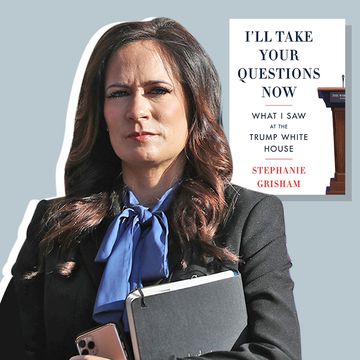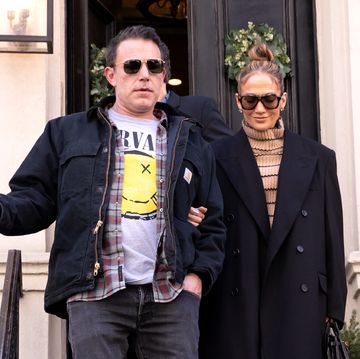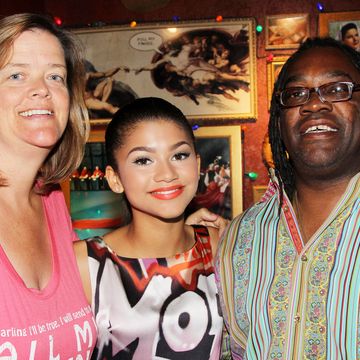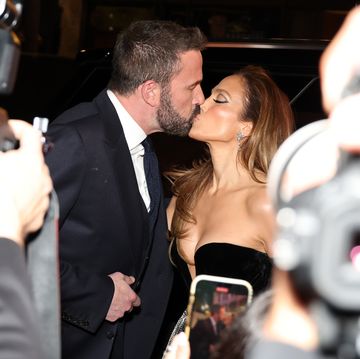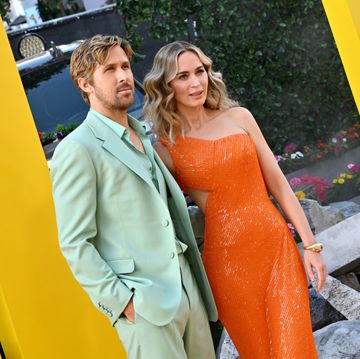There are predictable figures in Wild Wild Country, the new Netflix documentary series about the Rajneeshees cult (also sometimes called sannyasins) who spent four years living in the Oregon countryside in the early 1980s. There’s Bhagwan Shree Rajneesh, a spiritual guru. There are the followers themselves, most of them white, middle class, and college educated. But the actual villain and most compelling character of this story is a refreshing surprise. It’s Bhagwan’s right hand, his personal secretary who eventually showed how far a person granted an absurd amount of power will go to keep it. Here’s everything you need to know about the fearless (and ruthless) Ma Anand Sheela.
1. Her father introduced her to Bhagwan.
Ma Anand Sheela was born Sheela Ambalal Patel, daughter of a well-to-do family in what is now Mumbai. When she was 16, her father told her about a spiritual teacher he believed could become a second Buddha. Sheela and her father went to Bhagwan’s apartment where the guru’s early followers gathered, and, as she tells it in Wild Wild Country, when she first saw Bhagwan she became instantly devoted. Bhagwan embraced Sheela and, she says, “It was in this moment, if death were to have come, I accept. My life was complete.”
2. She's a Jersey girl. (Kind of.)
When Sheela was 17, before becoming fully embedded in Bhagwan’s life as a Rajneeshee, her parents sent her to the States to study at Montclair State College in New Jersey. There she met her first husband, Marc, who she describes in the documentary series as “a beautiful man, my first love.” Marc moved to India with Sheela to live at Bhagwan’s Poona ashram. He later died of Hodgkin’s lymphoma, a loss so profound Sheela says, “I have not known sorrow as deep as that.”
3. She was the mastermind.
Sheela admits in Wild Wild Country that, unlike the tens of thousands of people who flocked to Bhagwan’s ashram in Poona, she had no interest in meditation, at least spiritually speaking. “Meditation was a product. It was the product that brought the money,” she said. It was Sheela who marketed Bhagwan as a truly global brand. It was Sheela who orchestrated the purchase of 65,000 acres of land in Wasco County, Oregon. It was Sheela who found the architects, urban planners, scientists, accountants, and lawyers who could turn empty Oregon ranchland into a fully functional mini-city, Rajneeshpuram. And once the population of the commune had grown, it was Sheela who would end up leading the residents headlong into dangerous conflicts with their Wasco County neighbors. Later, in 1985, Sheela told Australia’s 60 Minutes, “[Bhagwan] had the dream, the vision, and I had the ability to put it into practice.”
4. The press loved her.
Sheela was strident, intentionally controversial and provocative on camera. She could be charming and witty on one talk show, and so aggressive on the next that her mic would be shut off. “Media is expensive, and one should not miss a chance for free publicity,” she says in the series. After fleeing Rajneeshpuram in 1985 when she saw her power in the commune waning, she cashed in on the press’s obsession with her by selling her story to Stern magazine in Germany (the profile included nude photos of Sheela).
5. She was vain.
One of Sheela’s closest aides, Jane Stork (known as Ma Shanti Bhadra at the commune), tells Wild Wild Country that one night, she was woken up and told to bring wax to Sheela's home. There, Sheela asked Stork to wax her legs. (Sheela does not directly address this anecdote in the film.)
6. She exploited (and maybe drugged) homeless people.
Rajneeshees essentially took over the nearby town of Antelope, Oregon, by buying local property and electing a Rajneeshee-majority city council. Sheela tried to sway the 1984 Wasco County elections by recruiting thousands homeless people who were eligible to vote from major cities all over the country. (The state government ultimately shut down voter registration before the election.) Predictably, many of these homeless people were angry at having been used for political gain. One of Sheela’s assistants says that following an incident where a homeless man tried to choke Sheela, commune officials began putting a sedative in the beer served to the homeless people at dinner. Again, Sheela does not directly address this anecdote in the film.
7. Poison was her weapon of choice.
After her plan to register homeless voters failed, Sheela began looking into other ways of swaying the election. “Now there was talk of killing people to get what you wanted, to get them out of the way,” Stork says in the series. Sheela and Ma Anand Puja, who ran the Rajneesh Medical Corporation, arranged for Rajneeshee scientists to culture salmonella in a lab on the commune and then sent Rajneeshees to restaurants to contaminate food in the weeks before the election. About 750 people became ill. In 1986, Sheela pled guilty to, among many charges, her role in the attack.
8. She tried to get her assistant to murder her enemies.
Twice Sheela tasked Stork with murder. First she sent her to Portland to meet up with sannyasins living there. They selected small handguns from a cache of weapons, and waited across the street from the Portland court house for Charles Turner, attorney general for the state of Oregon, to appear. When he didn’t, they gave up and went back to Rajneeshpuram.
Later, Sheela grew concerned that Bhagwan was giving too much power to his personal physician. She told her inner-circle she needed the doctor killed, and Stork volunteered. As Stork recalls, she was given a syringe containing an unknown substance, and Stork waited until the end of an assembly, stabbed the doctor in the back, and walked away. The doctor survived. In the interview with Australia’s 60 Minutes, Sheela laughs when asked about the incident.
9. Not even Bhagwan realized the depth of Sheela's power.
Jayananda, a former Wall Street financier, tells producers that Sheela “wanted to hear and control what was being said to Bhagwan.” She had Bhagwan’s rooms wiretapped, with a nearby tower equipped with recording equipment.
When Bhagwan is interviewed by Australia’s 60 Minutes following Sheela’s departure, he’s asked how he could have “missed Sheela’s shenanigans.” He replies, “Enlightenment simply means I know myself. It does not mean that I know that my room is bugged. Enlightenment and bugging have no relationship.”
10. She was not remorseful.
When the U.S. finally had all they needed to charge Sheela with crimes ranging from attempted murder to wiretapping to immigration fraud to arson, when she was finally questioned by prosecutors, they were horrified. “I was struck by how small and unimposing she was, because she had been a pretty big figure in Oregon at the time and frankly in my life,” former deputy attorney general for the state of Oregon, William Gary, says in Wild Wild Country. “She answered all of my questions with complete honesty and without the slightest trace of shame or regret or anything reflecting remorse… I left thinking this is a person with no empathy.”







